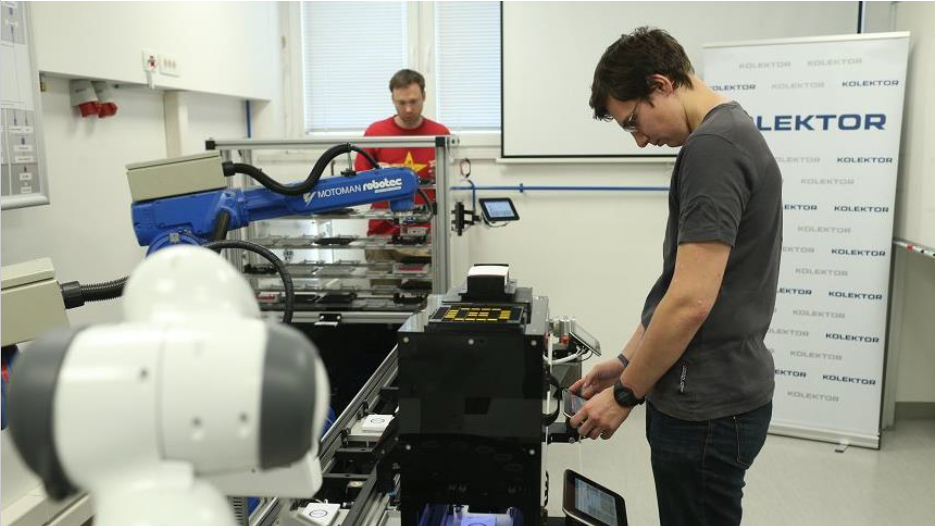Forging the future: UNIDO's journey to smart manufacturing excellence in Serbia
18 September 2023

Serbian SMEs in Slovenia
The 21st century heralds an era dominated by technological advancements and a desperate need for industries to adapt or risk being left behind. Addressing this urgency, the United Nations Industrial Development Organization (UNIDO) embarked on a mission to Slovenia, bridging the Serbian Small and Medium-sized Enterprises (SMEs) with the latest innovations from Slovenia’s industrial and academic landscapes. The goal was to navigate a future filled with Smart Manufacturing while fostering mutual benefits and collaboration.
The purpose of UNIDO's Slovenian tour had threefold objectives:
-
Facilitate the visit of Serbian SMEs and academia delegation to Slovenian production units to discuss collaborations for UNIDO's future projects, particularly in the Smart Manufacturing Innovation Centre (SMIC) services.
-
Explore and understand new technologies being used in production and acquaint the delegation with Slovenia’s supportive institutions that facilitate innovation.
-
Investigate EU projects involving Slovenian partners, particularly focusing on artificial intelligence (AI) applications in process management.
The journey was meticulously structured to give the Serbian delegation an insightful overview of three different sectors the project targets: industrial, academic and governmental.
Day 1 was a deep dive into the corporate sphere with visits to Yaskawa EU Robotics and Adria Home. Both companies demonstrated the potential of digital twins and AI in production. The second day was an academic immersion at the University of Ljubljana, exploring opportunities for collaboration with the SMIC at the Faculties of Mechanical and Electrical Engineering. Finally, the last day an engagement with the Slovene innovation ecosystem was organized, including a session at the Chamber of Commerce and Industry of Slovenia.
The delegation, comprised of eminent personalities from the Serbian private sector, academia, and UNIDO's project experts and management representatives, demonstrated enthusiasm and interest for the opportunity of visiting and meeting Slovenian excellences.
The driving force behind the tour was the establishment of the pilot Smart Manufacturing Innovation Centre (SMIC) in Serbia. SMIC aims to enhance Serbia’s manufacturing competitiveness and is envisaged as an institution that showcases: advanced digital technologies and new materials, assesses digitalization readiness and skill-building in manufacturing, offers technical services on Lean Management and Lean 4.0 Management for process optimization, provides comprehensive training packages on digitalization and automation.
The SMIC not only aims to uplift the Serbian SMEs by making them aware of digital transformation opportunities and challenges but also aspires to serve as a central hub of competence for the Fourth Industrial Revolution (4IR) technologies.
The tour's success was evident from the insights and learnings derived from the various visits at:
-
Yaskawa, Kočevje: The state-of-the-art factory specializes in producing YASKAWA GP robots. Their success story of utilizing a digital twin resulted in significant optimization, reducing plant size by 30% while boosting production throughput. Their sustainable approach, using green technologies and generating electricity via solar plants, was exemplary.
-
Adria Dom, Kanižarica: A leader in mobile home production, Adria Dom showcased its innovation in implementing a real-time guidance system for assembly line workers. Combining digital twins, AI, and smartwatches, this system increased production efficiency by a staggering 30%.
-
University of Ljubljana: The engagement with the university's faculties showcased potential collaborations with SMIC, emphasizing the significance of the academic-industrial nexus.
In essence, the UNIDO study tour to Slovenia was more than a mere exploration. It was a stride towards the future of smart manufacturing, aiming to integrate the best of what Slovenia offers into the broader global context, benefiting both nations in the process.
The hope is not only to have transmitted and collected useful information for the establishment of the SMIC, but also to have created connections for future cooperation.